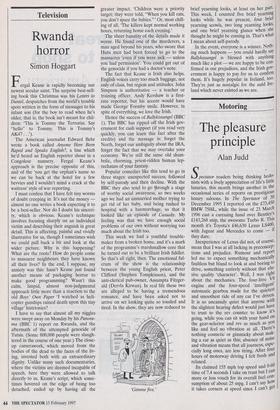Television
Rwanda horror
Simon Hoggart
Fergal Keane is rapidly becoming our newest secular saint. The surprise best-sell- ing book this Christmas was his Letters to Daniel, despatches from the world's trouble spots written in the form of messages to his infant son (for the boy to read when he's older, that is; the book isn't meant for chil- dren: 'This is Tommy the Terrorist. Say "hello" to Tommy. This is Tommy's AK47 . . .').
The American journalist Edward Behr wrote a book called Anyone Here Been Raped and Speaks English?, a line which he'd heard an English reporter shout in a Congolese nunnery. Fergal Keane's approach is the precise opposite of this, and of the 'you get the orphan's name so we can be back at the hotel for a few bevvies and I wouldn't mind a crack at the waitress' style of war reporting.
I must confess that I have felt tiny worms of doubt creeping in. It's not the money almost no one writes a book expecting it to be a best-seller. Nor do I doubt his sinceri- ty, which is obvious. Keane's technique involves focusing sharply on an individual victim and describing their anguish in great detail. This is affecting, painful and vividly illustrative for us, though I sometimes wish we could pull back a bit and look at the wider picture. Why is this happening? What are the roots? How do people come to massacre neighbours they have known all their lives? In the end, I suppose, my anxiety was this: hasn't Keane just found another means of packaging horror to make good programming? Wasn't this calm, limpid, almost non-judgmental approach little more than a reaction to the old Boys' Own Paper 'I watched as heli- copter gunships rained death upon this tiny village' histrionics?
I have to say that almost all my niggles were swept away on Monday by his Panora- ma (BBC 1) report on Rwanda, and the aftermath of the attempted genocide of Tutsis. (Some 800,000 people were slaugh- tered in the course of one year.) The close- up camerawork, which moved from the bodies of the dead to the faces of the liv- ing, invested both with an extraordinary dignity. Unlike many such documentaries, where the victims are deemed incapable of speech, here they were allowed to talk directly to us. Keane's script, which some- times hovered on the edge of being too detached, ended up by having all the greater impact. 'Children were a priority target; they were told, "When you kill rats, you don't spare the babies." ' Or, most chill- ing of all, 'The killers kept normal working hours, returning home each evening.'
The sheer banality of the details made it worse. He found one of the murderers, a man aged beyond his years, who swore that Hutu men had been forced to go to the massacres 'even if you were sick — unless you had permission'. You could get out of the genocide if you had a doctor's note.
The fact that Keane is Irish also helps. English voices carry too much baggage, not only of class, but region and attitudes. John Simpson is authoritative — a teacher or training officer. Andy Kershaw is a first- rate reporter, but his accent would have made George Formby smile. However, in spite of everything, we love the Irish.
Hence the success of BalVaSsangel (BBC 1). The BBC has ripped off the Irish gov- ernment for cash support (if you read very quickly, you can learn this fact after the credits) and the message is: forget the North, forget our ambiguity about the IRA, forget the fact that we may overtake your economy. We're still the same old sham- bolic, charming, priest-ridden human lep- rechauns of your fantasy.
Popular comedies like this tend to go in three stages: unexpected success, followed by self-parody and then decline. With the BBC they also tend to go through a stage of worthy social awareness, so two weeks ago we had an unmarried mother trying to get rid of her baby, and being rushed to hospital with a haemorrhage, so that it looked like an episode of Casualty. My feeling was that we have enough social problems of our own without worrying too much about the Irish too.
This week we had a youthful trouble- maker from a broken home, and it's a mark of the programme's marshmallow core that he turned out to be a brilliant Irish fiddler. So that's all right, then. The emotional ful- crum of the show is the relationship between the young English priest, Peter Clifford (Stephen Tompkinson), and the anti-clerical pub-owner, Assumpta Fitzger- ald (Dervla Kirwan). In real life these two are alleged to be having a tremendous romance, and have been asked not to arrive on set looking quite so tousled and tired. In the show, they are now reduced to `Gimme five.' brief yearning looks, at least on her part. This week, I counted five brief yearning looks while he was present, four brief yearning scowls, two long yearning looks, and one brief yearning glance when she thought he might be coming in. That's what I mean about self-parody. In the event, everyone is a winner. Noth- ing much happens — you could hardly say Ballykissangel is blessed with anything much like a plot — we are happy to be con- firmed in our prejudices, and the Irish gov- ernment is happy to pay for us to confirm them. It's hugely popular in Ireland, too. They're just as nostalgic for the auld Ire- land which never existed as we are.


























































 Previous page
Previous page